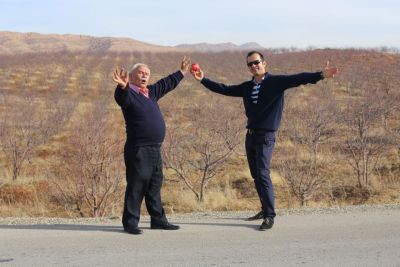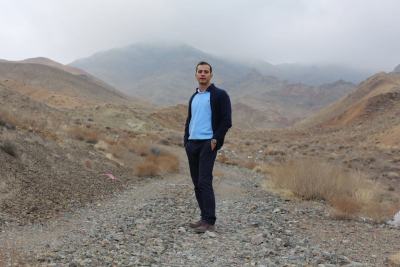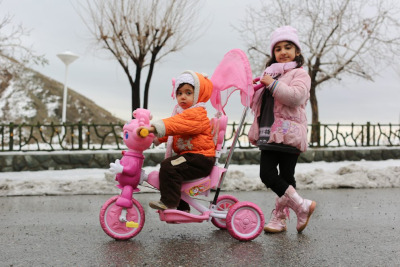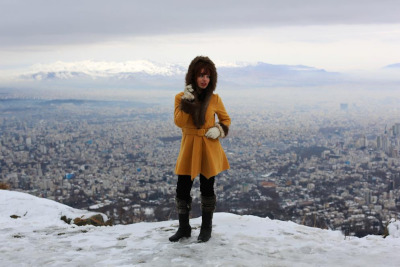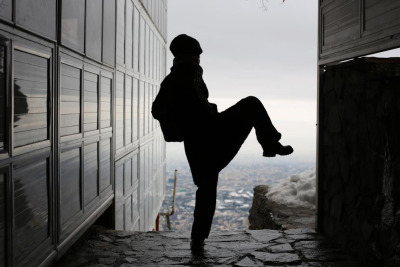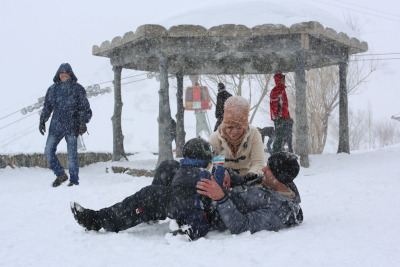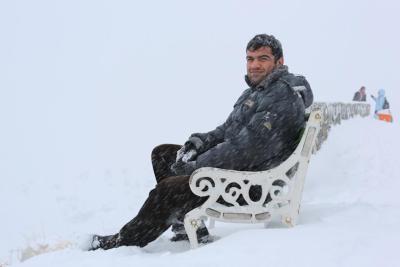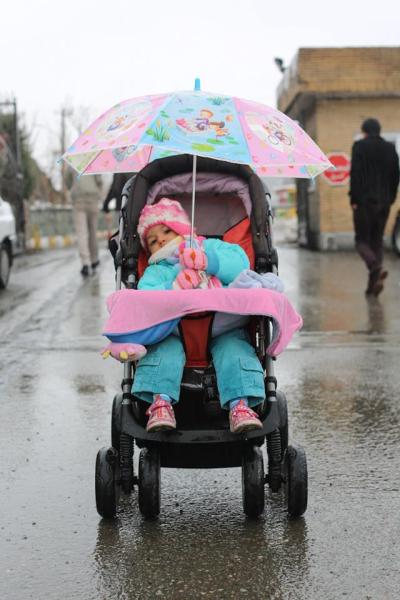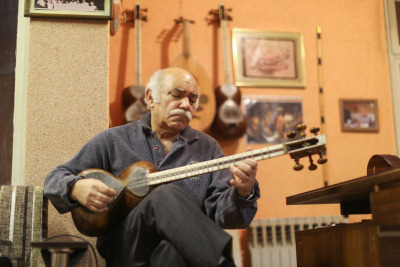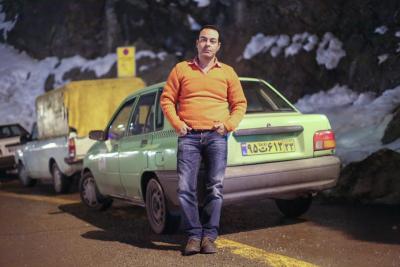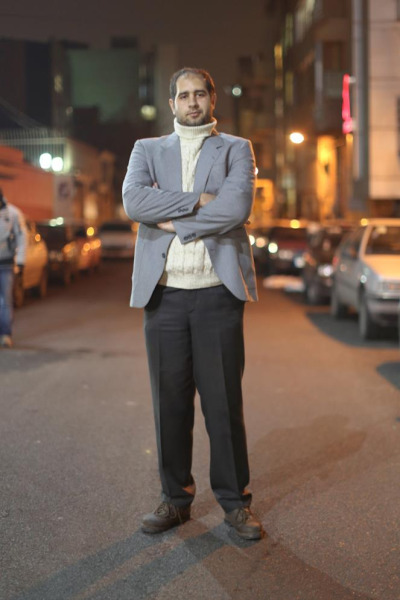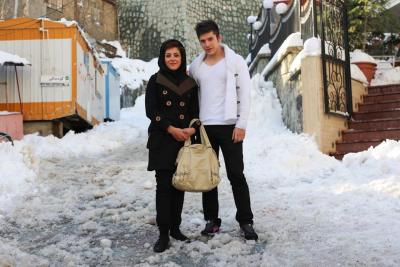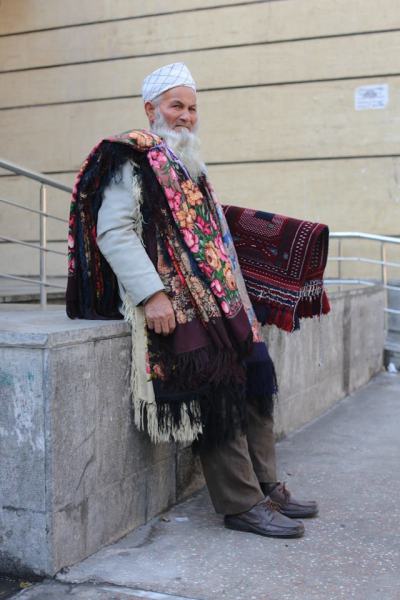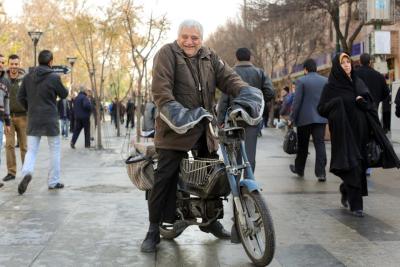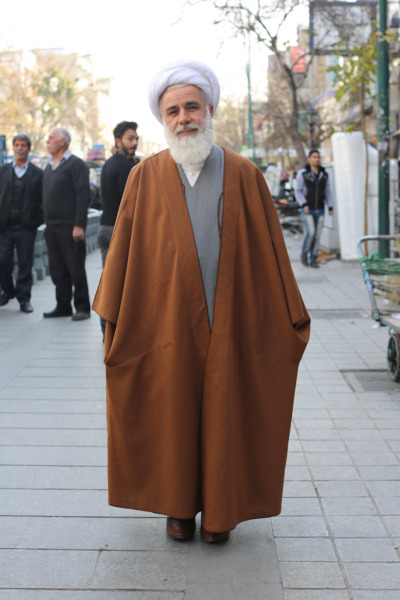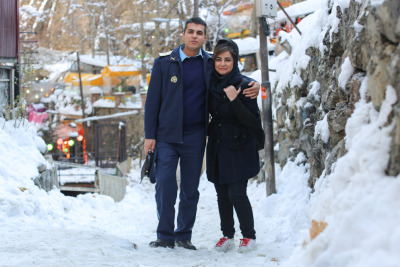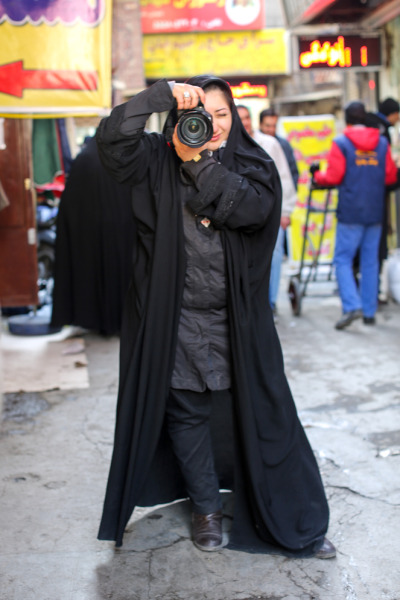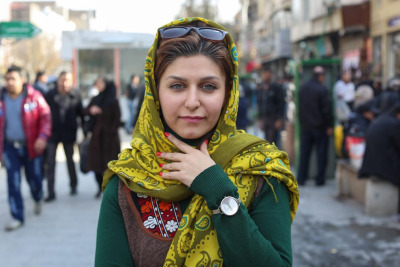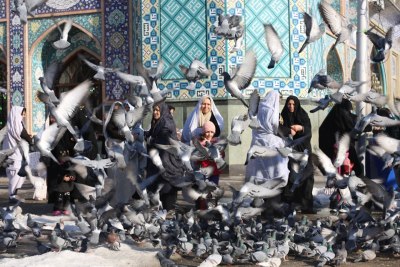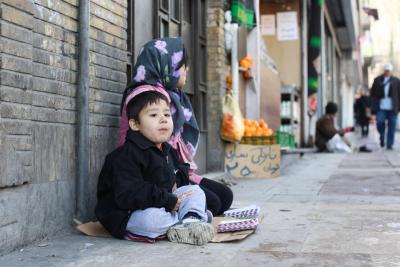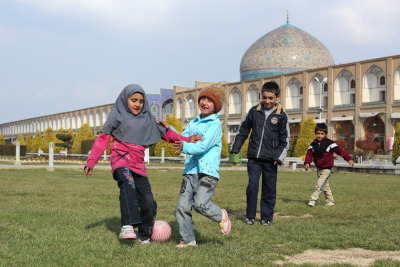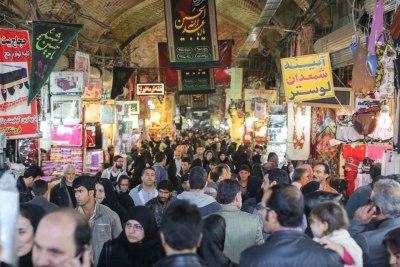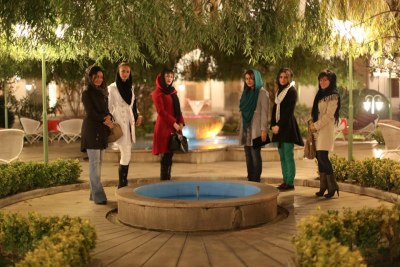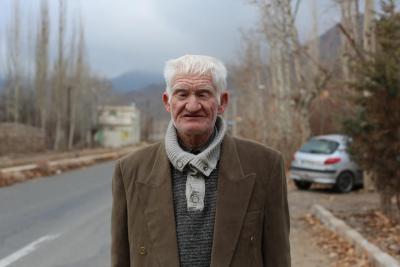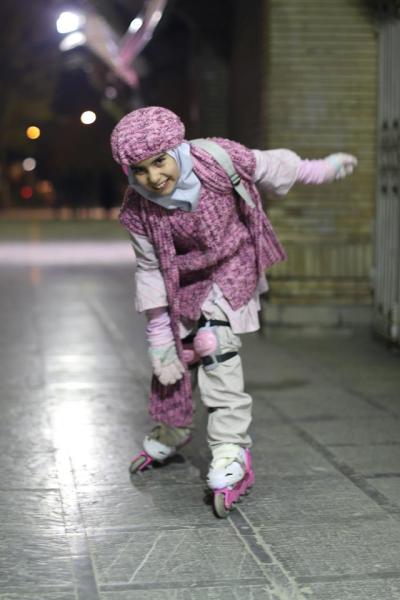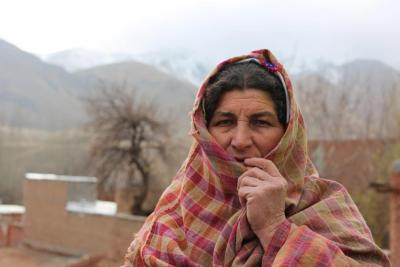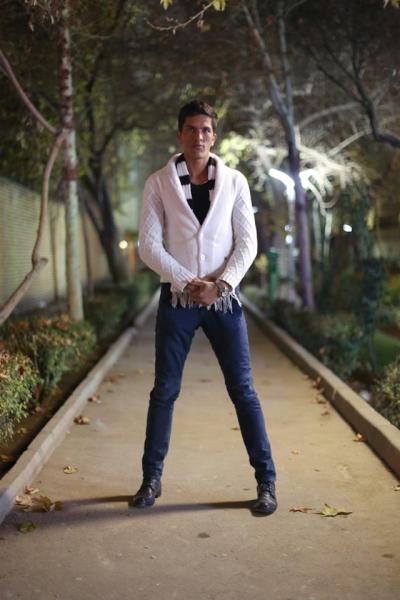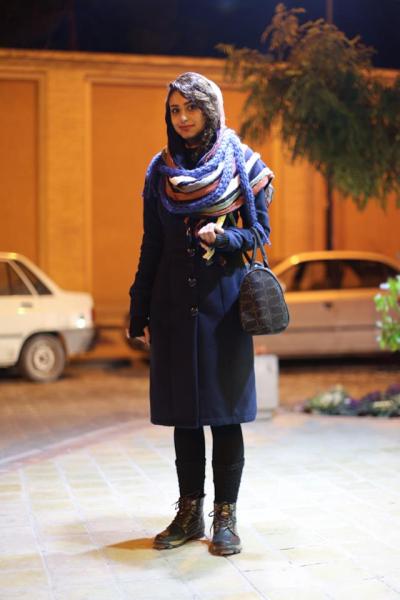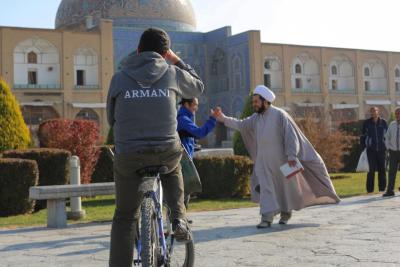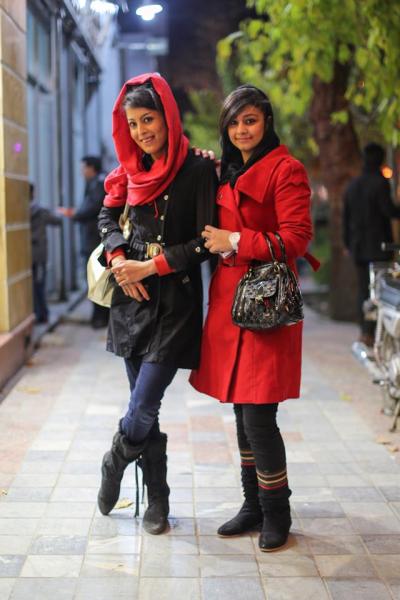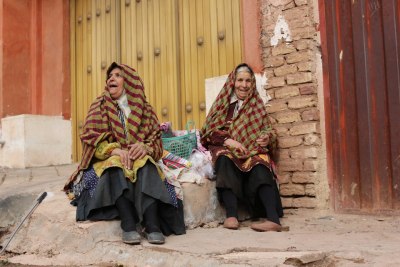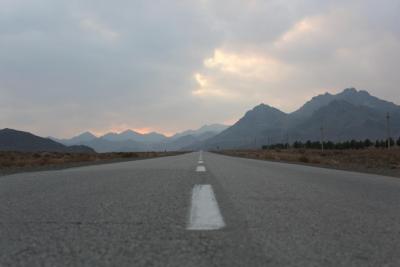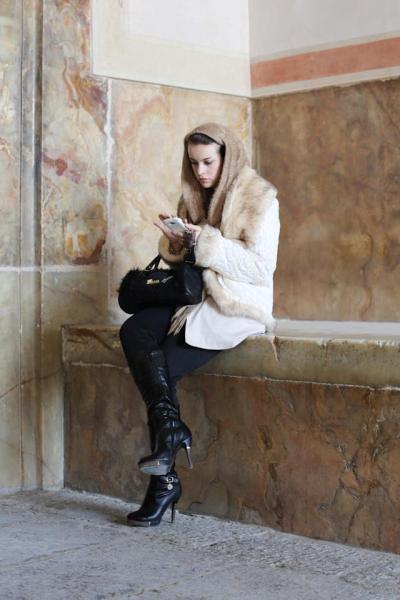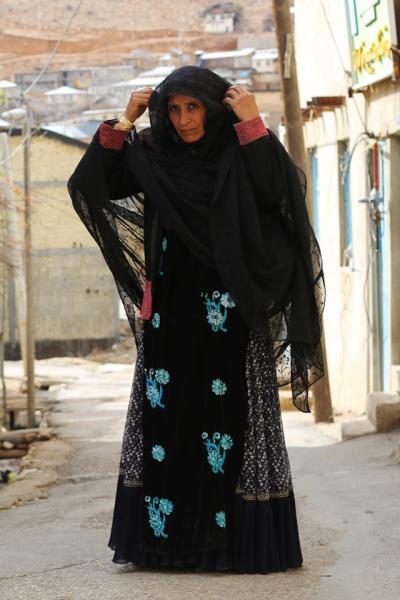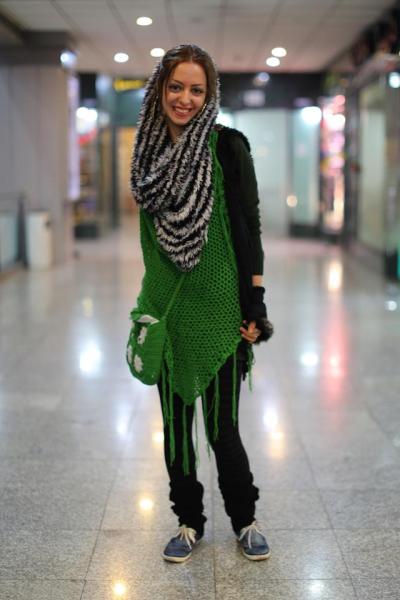ON TRAVEL TO IRAN:
The US Government has a lengthy travel warning for Iran. While not advising you to ignore this warning, I do advise that you balance it with direct accounts of Americans who have recently visited the country. These accounts are generally filled with superlatives— the country is beautiful, the history is rich, and the people are eager to demonstrate their almost-sacred commitment to hospitality.
Americans are especially loved. This was noted in every travel account that I read, and I can confirm the fact. You will be smiled at, waved at, invited to meals, and asked to deliver personal messages to Jennifer Lopez. American music, movies, and media are thoroughly consumed by the people of Iran. Like all countries, there are many different viewpoints, but the vast majority of people will associate you with a culture they admire and respect.
I was by no means starry eyed. I’m well aware of Iran’s modern history and government, though my portraits pointedly contained no mention of either. Some of the government’s policies are unfortunately impossible to ignore: Israelis, for example, are not allowed to enter the country. You cannot even enter the country if you have an Israeli stamp in your passport.* I mention this only because it’s well publicized and relavent to travel. I’m avoiding all other critiques, because I am foremost a photographer, and these issues are well-trodden by Western media outlets.
But I can tell you this: for two weeks I mingled with the culture, people, and scenery of Iran, with almost no interference from the government. (A privilege admittedly denied to Iran’s citizenry) I enjoyed the advantages that a tourist receives in any country. Like all countries, Iran has a strong economic interest in insuring its tourists enjoy themselves. Everyone in an official capacity will be very eager that you enjoy your stay. The unfortunate reality is that our two governments have hostile relations, so you will not be allowed to stay in Iranian homes, or go off on your own with Iranian friends. But you will be given extensive freedom to tour the country.
Because you are an American, you will be assigned a guide. But this will be an unexpected blessing. The guide is trained in tourism, and is by no means a government “minder." Beyond insuring that you adhere to the guidelines mentioned above, their job is to educate you on the history and culture of Iran. Assuming you have no interest in journalism or espionage, the guide will facilitate and expand your experience. In all likelihood, he/she will become your friend. My guide was Mohammad Eslami. If you plan on travelling to Iran, I recommend contacting him: mohammadjavad_82@yahoo.com
You will need a visa. This is most easily achieved through AITO, a tourism agency linked with the Foreign Ministry. In all likelihood it will be approved within 2 weeks. Your visa will need to be retrieved from the Pakistani embassy in Washington DC. (Though I believe you can arrange for it to be shipped.)
Lastly, travel to Iran is extremely cheap right now. It is a darkly beneficial effect of the recent currency devaluation. In very few places can you currently see more, for less.
I’ll close with the common cliche: Iran’s government is not its people. You can greatly enjoy a country, while at the same time disagreeing with it’s government. Travel is not advocacy of ideology or policy. Travel is travel, and it’s the single greatest contributor to understanding between cultures.
*Edited to reflect that Jews can enter the country, given that they’ve never been to Israel.
The US Government has a lengthy travel warning for Iran. While not advising you to ignore this warning, I do advise that you balance it with direct accounts of Americans who have recently visited the country. These accounts are generally filled with superlatives— the country is beautiful, the history is rich, and the people are eager to demonstrate their almost-sacred commitment to hospitality.
Americans are especially loved. This was noted in every travel account that I read, and I can confirm the fact. You will be smiled at, waved at, invited to meals, and asked to deliver personal messages to Jennifer Lopez. American music, movies, and media are thoroughly consumed by the people of Iran. Like all countries, there are many different viewpoints, but the vast majority of people will associate you with a culture they admire and respect.
I was by no means starry eyed. I’m well aware of Iran’s modern history and government, though my portraits pointedly contained no mention of either. Some of the government’s policies are unfortunately impossible to ignore: Israelis, for example, are not allowed to enter the country. You cannot even enter the country if you have an Israeli stamp in your passport.* I mention this only because it’s well publicized and relavent to travel. I’m avoiding all other critiques, because I am foremost a photographer, and these issues are well-trodden by Western media outlets.
But I can tell you this: for two weeks I mingled with the culture, people, and scenery of Iran, with almost no interference from the government. (A privilege admittedly denied to Iran’s citizenry) I enjoyed the advantages that a tourist receives in any country. Like all countries, Iran has a strong economic interest in insuring its tourists enjoy themselves. Everyone in an official capacity will be very eager that you enjoy your stay. The unfortunate reality is that our two governments have hostile relations, so you will not be allowed to stay in Iranian homes, or go off on your own with Iranian friends. But you will be given extensive freedom to tour the country.
Because you are an American, you will be assigned a guide. But this will be an unexpected blessing. The guide is trained in tourism, and is by no means a government “minder." Beyond insuring that you adhere to the guidelines mentioned above, their job is to educate you on the history and culture of Iran. Assuming you have no interest in journalism or espionage, the guide will facilitate and expand your experience. In all likelihood, he/she will become your friend. My guide was Mohammad Eslami. If you plan on travelling to Iran, I recommend contacting him: mohammadjavad_82@yahoo.com
You will need a visa. This is most easily achieved through AITO, a tourism agency linked with the Foreign Ministry. In all likelihood it will be approved within 2 weeks. Your visa will need to be retrieved from the Pakistani embassy in Washington DC. (Though I believe you can arrange for it to be shipped.)
Lastly, travel to Iran is extremely cheap right now. It is a darkly beneficial effect of the recent currency devaluation. In very few places can you currently see more, for less.
I’ll close with the common cliche: Iran’s government is not its people. You can greatly enjoy a country, while at the same time disagreeing with it’s government. Travel is not advocacy of ideology or policy. Travel is travel, and it’s the single greatest contributor to understanding between cultures.
*Edited to reflect that Jews can enter the country, given that they’ve never been to Israel.
There were a lot of uncertainties surrounding my trip to Iran. The US Government advises against all travel to Iran, and especially warns against photography. I travelled to Iran without knowing if I’d be able to achieve anything resembling my work in NYC.
I knew that a lion’s share of my success would hinge on one thing: my guide. Like all Americans, I was assigned a full time guide during my travels through the country. All I knew was that his name was Mohammad, and he was certified by the government to lead Americans.
Who was this man? And how was he going to respond when I told him: “Museums are great, but instead let’s walk around all day and ask strangers for their photograph."
Mohammad was an absolute godsend. He not only allowed my photography, but he believed in it and became a partner in its success. Asking strangers for photographs is an intimidating process. But he never once refused to make an approach. And almost always, he succeeded in securing permission.
As a result, the collection of photographs that emerged from this trip were a collaborative effort. I provided the eye, Mohammad provided the tongue. Without him, none of these photos would exist, and I am so thankful for his contribution.
I will be providing his contact info in my next post, regarding general guidelines for travel to Iran.
I knew that a lion’s share of my success would hinge on one thing: my guide. Like all Americans, I was assigned a full time guide during my travels through the country. All I knew was that his name was Mohammad, and he was certified by the government to lead Americans.
Who was this man? And how was he going to respond when I told him: “Museums are great, but instead let’s walk around all day and ask strangers for their photograph."
Mohammad was an absolute godsend. He not only allowed my photography, but he believed in it and became a partner in its success. Asking strangers for photographs is an intimidating process. But he never once refused to make an approach. And almost always, he succeeded in securing permission.
As a result, the collection of photographs that emerged from this trip were a collaborative effort. I provided the eye, Mohammad provided the tongue. Without him, none of these photos would exist, and I am so thankful for his contribution.
I will be providing his contact info in my next post, regarding general guidelines for travel to Iran.
Career Highlight: I was walking in a blizzard, on a mountaintop several thousand feet above Tehran, when this guy shouts: “I love your Facebook page!"
(Tehran, Iran)
(Tehran, Iran)
It’s been awhile since we’ve had a puppy-nuzzling-a-sheep-wrapped-in-a-blanket pic. I apologize for the oversight.
(Tehran, Iran)
(Tehran, Iran)
This man was driving me across Tehran yesterday, when I learned that he’d lived for 8 years in America— incidentally on the same STREET as me in Georgia.
He first crossed into the United States from Mexico— paying $1,500 to be transported across the border. He wanted to go to University and be a dentist, but learned that the idea of America was much more bountiful than the reality. He worked at a factory job for 8 years, without ever being able to get a drivers license. He wasn’t able to find a foothold in society. After 9/11, he said things got much tougher for Middle Eastern immigrants. “I had a great passion for the American people," he said. “When 9/11 happened, I had no money, so instead I gave my blood."
Five years ago he spent a night in jail for driving without a license. He decided he was tired of being nervous all the time, and he went all out for a green card. When he was turned down, he returned to Iran.
His fee for a 45 minute taxi ride across Tehran was only $6. I paid him the rate he’d have received in America, and asked for his photograph. He was the kind of man I most admire. The kind that realizes you get one shot at life, and risks everything to make the best of it. I was sorry it didn’t work out for him.
"It was my destiny," he said. He didn’t sound like he believed his own words though.
"Are you married?" I asked.
"Yes. I met my wife when I returned to Iran."
"Well there you go," I said.
As I prepared to take his photograph, he made one request: “Don’t photograph me with the taxi," he said, “it’s a low class job."
"It’s not a low class job," I said. “It’s the job of people who take huge risks so their children can be lawyers and surgeons."
(Tehran, Iran)
He first crossed into the United States from Mexico— paying $1,500 to be transported across the border. He wanted to go to University and be a dentist, but learned that the idea of America was much more bountiful than the reality. He worked at a factory job for 8 years, without ever being able to get a drivers license. He wasn’t able to find a foothold in society. After 9/11, he said things got much tougher for Middle Eastern immigrants. “I had a great passion for the American people," he said. “When 9/11 happened, I had no money, so instead I gave my blood."
Five years ago he spent a night in jail for driving without a license. He decided he was tired of being nervous all the time, and he went all out for a green card. When he was turned down, he returned to Iran.
His fee for a 45 minute taxi ride across Tehran was only $6. I paid him the rate he’d have received in America, and asked for his photograph. He was the kind of man I most admire. The kind that realizes you get one shot at life, and risks everything to make the best of it. I was sorry it didn’t work out for him.
"It was my destiny," he said. He didn’t sound like he believed his own words though.
"Are you married?" I asked.
"Yes. I met my wife when I returned to Iran."
"Well there you go," I said.
As I prepared to take his photograph, he made one request: “Don’t photograph me with the taxi," he said, “it’s a low class job."
"It’s not a low class job," I said. “It’s the job of people who take huge risks so their children can be lawyers and surgeons."
(Tehran, Iran)
He was driving down a crowded sidewalk, screaming: “Ahmadinejad is coming! Get out of my way!" When I stopped him for a photo, he laid out his daily schedule: “I smoke water pipe. Then I go to work. Then I smoke water pipe with apple flavor."
(Tehran, Iran)
(Tehran, Iran)
The clerics of Iran, for better or worse, are synonymous with the government. Their “party line" is the mirror image of their Western counterparts: “The American people are a good people," he says. “We have a problem with the American government."
(Tehran, Iran)
(Tehran, Iran)
An Iranian Air Force lieutenant takes a stroll with his girl in the
mountains of North Tehran.
(Tehran, Iran)
mountains of North Tehran.
(Tehran, Iran)
I tried to communicate my vision through my guide. I’d say we got about 80% of the way there. But between the beauty of the young women and the garden, I doubt anyone is looking too closely at composition.
(Isfahan, Iran)
(Isfahan, Iran)
This wonderful man crossed in front of us as we were speeding down a mountain road. His clothes, his hair, the lines on his face— he seemed to be a perfectly natural extension of the landscape.
(Abyaneh, Iran)
(Abyaneh, Iran)
I hesitated the first time she skated by, and missed my chance. So when she passed me twenty minutes later, I thought the Universe was trying to tell me something.
(Isfahan, Iran)
(Isfahan, Iran)
She was selling pressed fruit. I didn’t want to take her photo without buying something, so I asked my guide to make a purchase. He spoke with her for awhile, then said: “We can’t do it. The prices are too high. It’s a rip-off." I took another look at the woman, and the mountainous backdrop, and said:
"Pay her whatever she wants!"
(Abyaneh, Iran)
"Pay her whatever she wants!"
(Abyaneh, Iran)
A Chinese filmmaker congratulates an Iranian cleric who has just finished speaking on the meaning of Happiness, in fluent Mandarin. Boy in [apparent] Italian sweatshirt looks on. Scene captured by an American photographer. How’s that for Kumbaya?
"The meaning of happiness is different for everyone. Though the happiness is the same, the paths to that happiness are many. Even within monotheism, even within Islam, there are many different paths. Outside of monotheism, those paths increase exponentially." (His answer, translated back into Farsi, then into English.)
(Isfahan, Iran)
"The meaning of happiness is different for everyone. Though the happiness is the same, the paths to that happiness are many. Even within monotheism, even within Islam, there are many different paths. Outside of monotheism, those paths increase exponentially." (His answer, translated back into Farsi, then into English.)
(Isfahan, Iran)
I know this is not a chicken blog. But when you snag a sweet chicken pic, you just want to tell the world.
(Sepidan, Iran)
(Sepidan, Iran)
I came to photograph people, but the natural beauty of this country is astounding. Today was a climbing drive through craggy mountains, wrapped in fog, and punctuated with pockets of light. Enough to make a man want to lean out the window and scream: “Irannnnnnn!"
(Isfahan, Iran)
(Isfahan, Iran)
When I walked up, the dog started barking aggressively. The man calmed the dog with one word. He stopped barking, rolled over on his back, and got a nice belly scratch. It was a touching demonstration of their relationship. I could tell they spend very little time apart.
(Sepidan, Iran)
(Sepidan, Iran)


